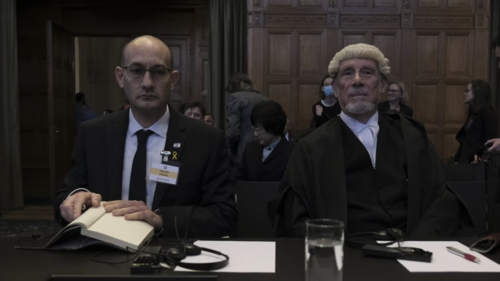Israel has Occupied Palestinian Territories Since 1967; UN Court Considers Whether that's Legal

The United Nations General Assembly has asked the organization’s court to give advice on what legal consequences Israel should face for its decades-long occupation of the Palestinian territories.
In short: The United Nations General Assembly has asked the organization’s court to give advice on what legal consequences Israel should face for its decades-long occupation of the Palestinian territories. On Feb. 19, the International Court of Justice began hearings, during which 52 countries and three international organizations are expected to provide their opinions to the court. Israel has opted to submit a written statement, while the State of Palestine made in-person remarks to the court on Monday. Israel first took control of the Palestinian territories in the West Bank and the Gaza Strip as part of the 1967 Six-Day War, and it heavily restricts movement for the 5 million Palestinians who live in these territories.
What is the ICJ case involving Israel’s occupation of Palestinian territories?
The U.N. General Assembly approved a resolution at the end of December 2022 that condemned Israel’s behavior in the Palestinian territories and asked the ICJ, the U.N.’s main judicial body, to issue an advisory opinion in response to two questions:
- What legal consequences could come from Israel’s occupation of the Palestinian territories?
- Could Israel’s occupation of the Palestinian territories result in any legal consequences for the U.N. and its member nations?
According to a 2001 U.N. convention, Israel’s occupation of the Palestinian territories could have legal consequences for the U.N. and other member nations if it is determined to be a “serious” breach of international law. In that case, other U.N. countries could be held responsible for collaboratively bringing an end to any unlawful activities.
After several months accepting preliminary written arguments, the ICJ began oral proceedings in the case on Feb. 19. During these hearings, representatives of various countries and international organizations will make statements to the court about how they think it should rule.
Statements are expected from the League of Arab States, the Organisation of Islamic Cooperation, the African Union, and 52 countries – more than have participated in any other case in ICJ history. Israel, notably, will not participate in the oral proceedings; instead, the country submitted a written statement to the court.
In its statement, Israel said the questions the U.N. resolution posed to the ICJ “represent a clear distortion of the history and present reality of the Israeli-Palestinian conflict.”
Palestinian interests, on the other hand, were represented in-person at the proceedings. The State of Palestine (as the Palestinian territories are known at the U.N., where they have non-member observer status) was the first party to testify in front of the court. They argued that Israel’s occupation breaches the U.N.’s founding charter by denying Palestinians the “right to self-determination” — a right that the charter says is fundamental to peaceful international relations.
“It has taken the Palestinian people decades of painful struggle to stand before you today,” said Riad Malki, the Palestinian minister for foreign affairs and expatriates, in Monday’s remarks. “We appeal to the Court to uphold our rights to self-determination, return and all other human rights, including by declaring that the Israeli occupation is illegal and must end immediately, totally and unconditionally.”
Other countries scheduled to participate in the oral hearings include the United States, China, Russia, and South Africa. South Africa brought another case to the ICJ at the end of 2023 accusing Israel of genocide against the Palestinian people for its military operations in the Gaza Strip since Oct. 7.
On Oct. 7, Hamas launched an attack against Israel, killing about 1,200 Israelis, mostly civilians, and taking more than 200 hostages. In response to the attack, Israel launched a “complete siege” on Gaza that has now killed at least 29,000 Palestinians, most of them women and children, leading some to declare the conflict “the deadliest and most destructive” military campaign in recent history.
How long has Israel occupied the Palestinian territories?
Before the establishment of Israel, the U.N. passed a resolution that proposed splitting the territory then known as Palestine into two states – one comprised mostly of Palestinian Arabs and the other made up mostly of Jewish people, including many from Europe who had settled in the area after fleeing the Nazis.
However, conflict between Arab and Jewish groups started after the U.N. resolution, preventing the proposal from coming to fruition. In 1948, Israel declared itself a sovereign nation, and war broke out between Israel and the surrounding Arab nations. Israel started annexing Palestinian territory during this war (known as the First Arab-Israeli War), and by the end of the conflict, Israel had expanded its borders to include 77% of what was considered Palestine before 1947.
The remaining Palestinian territories – primarily the West Bank, Gaza, and East Jerusalem – were then brought under the control of Jordan and Egypt. Following two decades of smaller conflicts, Israel again went to war with its Arab neighbor states in 1967, during the Six-Day War.
The war was initially about a shipping conflict between Egypt and Israel, but it ended up reshaping the dynamics in the Middle East by establishing Israel’s military dominance over other nations in the region. Israel began an occupation of East Jerusalem, the Gaza Strip, and the West Bank during the war that has held ever since – and it’s this half-century of occupation that the ICJ case is focused on.
Israel’s restrictions on each of these territories differ, but one practice that Israel has followed in every Palestinian territory is land confiscation to create Israeli settlements. According to the Israeli movement Peace Now, there are 146 settlements in the West Bank that have been sanctioned by the Israeli government and 144 outposts, which are settlements that don’t have government approval but remain occupied. There are also 14 settlements in East Jerusalem.
Israel does not currently have settlements in Gaza. The country removed its settlements and military from Gaza in 2005 under a plan of “disengagement” so that “there will be no basis to the claim that the Strip is occupied land,” according to a U.N. brief quoting Israel’s disengagement plan. At a recent convention of right-wing Israeli settlers, though, some called on the government to resettle the region.
Most Palestinians who live in occupied territories are not granted Israeli citizenship, so they are not allowed to vote in Israeli elections despite living under full or partial Israeli rule. East Jerusalem is governed by Israel, while the West Bank is partially governed by the Palestinian Authority. Hamas currently governs Gaza.
Israel has restricted movement in and out of Gaza since 2007 through the implementation of a blockade. In the West Bank and East Jerusalem, there’s no formal blockade, but an extensive network of checkpoints and barriers run by the Israeli military puts a similar restriction on Palestinian residents’ freedom of movement.
In 2022, a U.N. Commission of Inquiry declared that Israel’s occupation of the Palestinian territories was in violation of international law because of “its permanence and the Israeli Government’s de-facto annexation policies.”
Despite this, Israel’s settlement activity in the region has continued. According to Peace Now, a record number of housing units were “promoted in settlements” in the West Bank in 2023: 12,349.
What’s next?
After oral proceedings conclude at the ICJ on Feb. 26, the court will begin its deliberation on whether the occupation is legal.
While any ICJ ruling wouldn’t be legally binding, Vienna School of International Studies professor Holger Hestermeyer told TIME that it still carries weight.
“It is after all rendered by the highest court in the international system,” he said.
South Africa’s separate case against Israel is still making its way through the ICJ, but the court ruled on Jan. 26 that, while the case is under deliberation, Israel must take all the measures it can to prevent genocide in Gaza.

